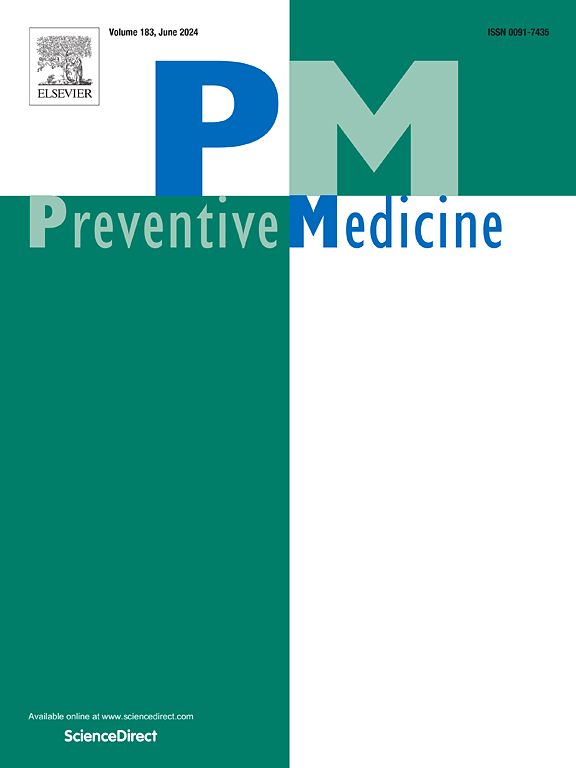Psychosocial factors and associations with preventive cardiovascular screening among U.S adults: Findings from the National Health Interview Survey, 2023
IF 3.2
2区 医学
Q1 MEDICINE, GENERAL & INTERNAL
引用次数: 0
Abstract
Objective
Structural and COVID-related factors have been linked with the decline in preventive health screenings among adults. However, associations between psychosocial factors and undergoing preventive cardiovascular screening are not fully known. The current study examined associations between psychosocial factors and preventive cardiovascular screening among U.S. adults.
Methods
We used data from the 2023 National Health Interview Survey (N = 23,428). Data were collected from January to December from adults living in U.S. Preventive cardiovascular (CV) screening (i.e., blood pressure, cholesterol, or blood sugar level) was defined as no screening, and undergoing screening for any CV risk within the past year. Psychosocial factors were defined as discrimination, life satisfaction, and depression. Multivariable logistic regression models examined the associations between psychosocial factors and preventive cardiovascular screening, adjusted for sociodemographic characteristics.
Results
Adults with diagnosis of depression (OR: 1.93, 95 % CI: 1.65–2.25) had higher odds of undergoing screening for any CV risk. Adults who experienced discrimination had lower odds of undergoing screening for cholesterol (OR: 0.77, 95 % CI: 0.71–0.84) and blood sugar level specifically (OR: 0.78, 95 % CI: 0.72–0.85), while life dissatisfaction was associated with lower odds of screening for blood pressure (OR: 0.76, 95 % CI: 0.58–0.99) and blood sugar level specifically (OR: 0.80, 95 % CI: 0.65–0.97).
Conclusions
Discrimination and life dissatisfaction were associated with decreased odds of undergoing specific preventive cardiovascular screening, and depression is associated with increased odds of undergoing any preventive cardiovascular screening. Equitable health care policies focused on addressing psychosocial factors are needed to increase preventive cardiovascular screening among U.S. adults.
美国成年人预防心血管筛查的心理社会因素和关联:来自国家健康访谈调查的结果,2023
目的:结构性和与covid相关的因素与成年人预防性健康筛查的下降有关。然而,社会心理因素与接受预防性心血管筛查之间的关系尚不完全清楚。目前的研究调查了美国成年人中心理社会因素和预防性心血管筛查之间的关系。方法:使用来自2023年全国健康访谈调查(N = 23,428)的数据。数据收集于1月至12月,来自生活在美国的成年人。预防性心血管(CV)筛查(即血压、胆固醇或血糖水平)定义为未筛查,并在过去一年内接受任何CV风险筛查。社会心理因素定义为歧视、生活满意度和抑郁。多变量logistic回归模型检验了社会心理因素与预防性心血管筛查之间的关系,并根据社会人口统计学特征进行了调整。结果:诊断为抑郁症的成年人(OR: 1.93, 95 % CI: 1.65-2.25)接受任何CV风险筛查的几率更高。经历过歧视的成年人接受胆固醇筛查(OR: 0.77, 95 % CI: 0.71-0.84)和血糖水平筛查(OR: 0.78, 95 % CI: 0.72-0.85)的几率较低,而生活不满与接受血压筛查(OR: 0.76, 95 % CI: 0.58-0.99)和血糖水平筛查(OR: 0.80, 95 % CI: 0.65-0.97)的几率较低相关。结论:歧视和生活不满与接受特定预防性心血管筛查的几率降低有关,而抑郁与接受任何预防性心血管筛查的几率增加有关。在美国成年人中,需要注重解决心理社会因素的公平卫生保健政策来增加预防性心血管筛查。
本文章由计算机程序翻译,如有差异,请以英文原文为准。
求助全文
约1分钟内获得全文
求助全文
来源期刊

Preventive medicine
医学-公共卫生、环境卫生与职业卫生
CiteScore
7.70
自引率
3.90%
发文量
0
审稿时长
42 days
期刊介绍:
Founded in 1972 by Ernst Wynder, Preventive Medicine is an international scholarly journal that provides prompt publication of original articles on the science and practice of disease prevention, health promotion, and public health policymaking. Preventive Medicine aims to reward innovation. It will favor insightful observational studies, thoughtful explorations of health data, unsuspected new angles for existing hypotheses, robust randomized controlled trials, and impartial systematic reviews. Preventive Medicine''s ultimate goal is to publish research that will have an impact on the work of practitioners of disease prevention and health promotion, as well as of related disciplines.
 求助内容:
求助内容: 应助结果提醒方式:
应助结果提醒方式:


